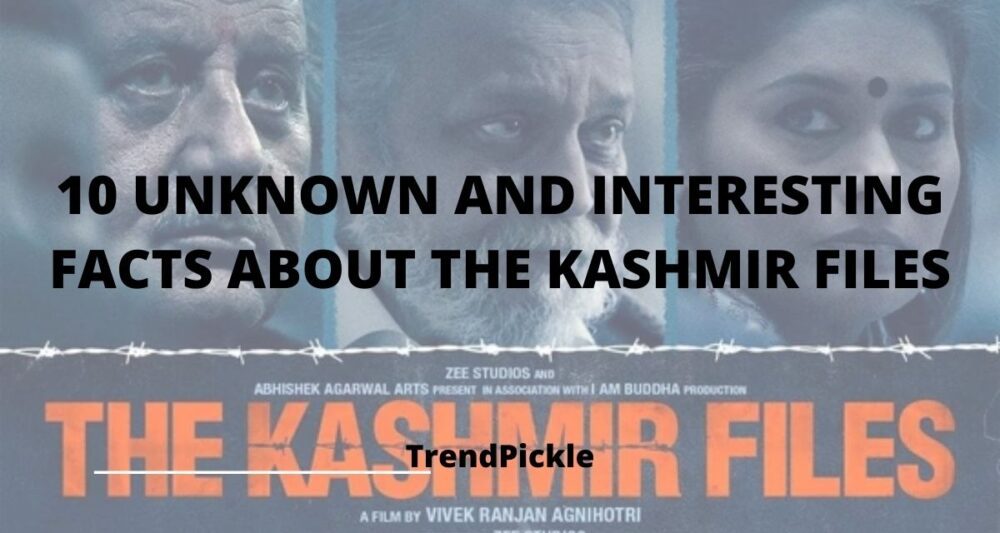The Kashmir Files, a Anupam Kher starrer, is based on the Kashmiri Hindu exodus of 1990. The film is a narrative of a college student who learns that his Kashmiri Hindu parents were murdered by Islamist terrorists and not by mishap as his grandpa claimed. The Kashmir Files is a documentary based on interviews with first-generation survivors of the 1990 Kashmiri Pandit Genocide. Supporters believe it brings attention to a forgotten and violent period in Kashmir’s history, while detractors argue it is inaccurate and Islamophobic.
The movie has also been accused of factual revisionism and a lack of complexity in its narration. During just two days of its release, the picture became a box office triumph. The film had collected Rs. 2,608.1 million in India and 279.4 million elsewhere as of March 26, 2022, for a total global revenue of Rs.2,887.5 million. Released on 11 March, this film has attracted a LOT of controversy! “We have tried to show that when militancy enters a community and is given ideological support from a part of the society, it leads to disaster,” Agnihotri said, adding that his movie was based “entirely on facts”.
Here are a few lesser known facts about the Kashmir Files:
The film is based on real events
Even though many call it a fictional film, the movie and its characters are based on real events of the exodus of the Kashmiri pandits in the Nadimarg massacre in 1990.
Last of the descendants of the Saraswati civilization
The Kashmiri pandits were the last of the descendants of the creator of the Saraswati civilization. They’ve been dispersed seven times over Bharatvarsha’s ancestral territory. Their ancestors are still known as “Sarasvat Brahmins” and may be found in far-flung parts of India, from north to south, west to east.
700 interviews?
Vivek Agnihotri is said to have recorded over 700 interviews of the victims of the exodus.
Legal battles
Several PILs were filed against the film including one by the widow of an Indian Airforce squadron leader who was martyred during the exodus. She claimed that the events were falsely depicted and hence the court asked the makers to not show those scenes.
The symbolism in the film
Kashmir is the ‘jannat’ of Hindu religion. It is the birthplace of Shaivism. In the movie, Agnihotri has deliberately named the characters as Sharda, Radhika, Krishna, Brahma Dutt, Shiv, Shankar Nath, etc. to depict the importance of Kashmir in the Hindu religion.
Reel vs Reel
‘Bitta’ from the movie is a character based on Farooq Ahmed Dar, a member of the Jammu Kashmir Liberation Front (JKLF) who has confessed on camera that he was one of the kingpins behind killing of almost 20 pandits in Kashmir in the exodus. The character of Radhika Menon is based on the real life of Nivedita Menon, a JNU professor of Political science. Other characters like Brahma Dutt, Krishna Pundit, Sharda as based on real lives as well.
Blood soaked rice
There is a scene in the film where the wife of an engineer named Ganjoo is asked to eat rice which is soaked in her husband’s blood after they killed him. This incident is inspired by an actual incident. He was betrayed by his own neighbors and let to die on grains of rice after pelting bullets through him.
Some more legal battles
A fatwa was issued against the Vivek Agnihotri and his wife but they did not reveal this to their team and continued shooting for this film. A fatwa is a legal opinion or decree handed down by an Islamic religious leader.
No tax?
A tax- free movie in many states. Several States like Gujarat, Uttar Pradesh, Karnataka and Haryana are not charging any tax on the film.
Cops on leave to watch the film
Narottam Mishra, the Home Minister of Madhya Pradesh, revealed in a press conference that the entire police force of the State would get a leave to watch the film!
In the post-pandemic society, The Kashmir Files has become the most popular Hindi film. The Vivek Agnihotri-directed picture has accomplished what even the most evolving Hindi blockbusters with the most famous excellent cast and never-ending advertising efforts have failed to do. This was accomplished in under two weeks — for a total of 13 days. This level of achievement isn’t a miracle. It isn’t a pre-planned riot at the theatre. This is the outcome of the power of the audience and the learnings that most directors overlook when selecting a tale. The most important lesson to learn from The Kashmir Files’ success is to never underestimate the power of word-of-mouth marketing. Their belief in a tale is the best indicator of a film’s success, whether it’s based on a true storey or not! Blockbusters are generated by the crowd, not by the producers!

